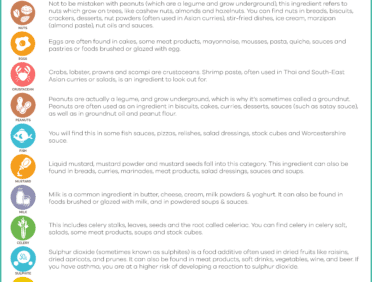What is Natasha’s Law?
Natasha’s Law is a law that has been designed and implemented as a way to ensure that people who have food allergies are protected as much as possible. Within the law both the food labels and ingredient lists of prepacked foods will need to meet a full level of compliance, in order to stop these people being put at risk.
It came in on the 1st of October 2021.
The History Behind Natasha’s Law
In 2016 Natasha Ednan-Laperous bought a baguette from Pret a Manger at Heathrow Airport. She was excited to find a baguette that contained two of her favourite foods, olive and artichoke.
It was known that Natasha had allergies and so she was careful to check the ingredients within the baguette for her known triggers. The ingredient list did not contain anything that she would be allergic to, therefore she thought it was safe to eat.
Unfortunately, the baguette actually contained sesame seeds, which were hidden within the bread. This was not listed on the ingredients and was something that Natasha was allergic to.
Her reaction started on the flight from Heathrow to Nice and despite her father administering 2 EpiPens during the flight, she did not recover and was pronounced dead at the hospital that same day.
She was only 15 years old.
Why is Natasha’s Law so important?
The simple reason that Natasha’s Law is so important is that if the ingredient list was accurate and contained the full list of ingredients, including the sesame seeds, then she would not have eaten it.
It would have saved her life.
Who is exempt from Natasha’s law?
Whilst Natasha’s Law must be followed by many food outlets, there are some that are exempt. This includes any food that is packed after being ordered by the consumer, or if the food that is packed is going to then be supplied to another business.
Food that is distance sold, such as being ordered over the phone or online is also not covered by Natasha’s Law.
Prepacked for direct sale (PPDS)
The Food Standards Agency defines any food that is packed before being offered for sale by the same food business as Prepacked for Direct Sale or PPDS.
This could mean that the food is sold on the premises it is made and packaged, or it could be somewhere on the same site, but away from the premises.
It also covers food that is made and then moved away into temporary premises, this could be a market stall or perhaps a mobile sale vehicle, so long as it is sold by the same business that originally packed it.
To be considered as being prepacked, the packaging should be fully or mostly closed and the food inside cannot be altered without something happening to the packaging. It should be ready and presented for the final consumer to buy.
What is not PPDS Foods?
Some examples of what could be identified as not being PPDS foods include:
- Fruit and vegetables
- Food that is sold in a deli or that is sold from a deli counter in a supermarket
- Fresh bread that is sold in bakeries
- Meat that is sold in a butcher’s shop.
These foods do not need to be labelled within Natasha’s Law.
What items will Natasha’s Law impact?
Natasha’s Law will impact any foods that are sold prepacked. These are foods that once packed, are then sold in the same premises, direct to the customer. It could be sandwiches, cakes and salads or meals.
So long as they are pre-packed there on site.
What needs to be on the label?
In order to meet the regulations that are set out within Natasha’s Law you must ensure that pre-packed foods that are sold directly to the consumer, must include the labels for:
- The food name (this must be descriptive and in no way misleading)
- A full ingredient list that starts higher in weight and then descends to the lower weights
- Any additives should include their E-number, technological function and their name
- The percentage of meat content (should it be a meat product)
- Any irradiated or genetically modified ingredients that are within the product
Not only does Natasha’s Law cover what the labels should contain, but it also outlines how the ingredients and food list should look:
- The font should be at least 1.2mm in height, so long as the surface area of the packaging is equal to or more than 80 cm2. Anything under that can have a font size that is 0.9mm.
- If the packaging is less than 10cm2 then you will not need to have an ingredient list, however, it should still contain all of the relevant allergen labelling.
What Does Natasha’s Law Mean for my business?
If your business sells food that is pre-packed and ready to be sold to your customers, then you must provide full ingredients and allergens to the packaging to comply with Natasha’s Law. This covers food items such as sandwiches, salads and cakes too.
What does Natasha’s law mean for schools?
If a school offers students food that is pre-packed on-site, then they will need to ensure that they meet Natasha’s Law. However, if they do not pre-package the food on-site, but it is supplied to them by a caterer, then this will not be something that the school needs to focus on.
Distant selling
Food that falls within distant selling (an example of this is a takeaway) does not need to be labelled as per Natasha’s Law. However, it is still important to ensure that clients are aware of possible allergens so that they can make an informed decision on what they buy and eat.
Does Natasha’s Law apply to school cake sales?
Natasha’s Law only applies to those that are registered as a food business. This means that it does not apply to schools. In most cases that is. PTA’s and Friends of Schools do not supply food on a regular basis, even if they occasionally offer food, which means that they don’t have to register as a food business.
Does Natasha’s Law apply to takeaway food?
Takeaway foods are classed as distant selling, which means that they are not covered by Natasha’s Law. However, any takeaway must provide allergen information, this could be either in writing, or it could be verbal.
Does Natasha’s law apply to pubs?
If a pub offers up food that is pre-packaged and then sold directly to a customer, then it needs to meet the regulations that are set out by Natasha’s Law. However, if the food that it sells is not packaged, perhaps served up to them as a meal, they need to make sure that they still offer up information on the allergens so that they are aware of what they are ordering and what it contains.
You can download our FREE allergens poster to put up in the kitchen of your food business by clicking here.
Food Safety Online Training
If you haven’t already got it, one way to start training yourself and your colleagues is to take a Food Hygiene course, and to learn more about Allergens you can supplement that by taking an Allergen Awareness course.
- Level 2 Food Safety Training: is an introductory course that covers basic food safety principles and practices. This qualification is designed for anyone who works with food, including front-line staff and supervisors. The course typically covers topics such as food hygiene, food contamination, food storage and preservation, and personal hygiene.
- Level 3 Food Safety Training: is an advanced course that provides a more detailed understanding of food safety principles and practices. This qualification is designed for managers and supervisors who have responsibility for food safety in their workplace. The course typically covers topics such as food safety legislation, HACCP principles, risk assessment, and management of food safety hazards.
Level 2 training is more basic and suitable for front-line staff, while Level 3 training is more advanced and suitable for managers and supervisors with greater responsibility for food safety in their workplace.
However, you can buy both of the above for just £17.50 as one of our money saving bundles.
All of our courses have discounts for 10+ orders
Or SAVE OVER 50% and ensure your business is even safer by choosing one of our bundles:













